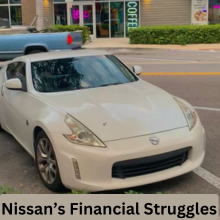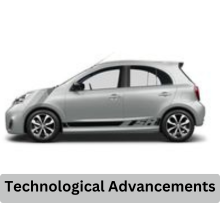
In a surprising turn of events, Nissan and Honda, two of Japan’s most well-known automotive brands, are reportedly engaged in discussions regarding a merger. This move comes at a time when the global automotive industry is going through significant changes, primarily driven by the shift toward electric vehicles (EVs) and growing competition from companies like Tesla and Chinese manufacturers. But why would these two established automakers consider merging? The answer lies in the tough new realities they face, including cost-cutting pressures and the need to adapt to rapidly changing technological advancements. Let’s explore the details behind this potential merger and why it matters.
Why It Matters
Nissan, one of the largest automakers in Japan, has been under increasing financial pressure. In recent months, the company has been implementing drastic cost-cutting measures. These include shedding a fifth of its global production capacity and laying off around 9,000 employees. The company’s financial struggles have been exacerbated by its inability to regain the momentum it once had after the high-profile ouster of former CEO Carlos Ghosn.
Similarly, Honda, known for its commitment to quality and its resistance to offering discounts, has been facing similar challenges in a rapidly changing automotive landscape. Both companies are fighting to keep up with the rise of electric vehicles, which has significantly altered the competitive dynamics of the industry. The stakes are particularly high in China, which has become a battleground for EV sales. With companies like BYD surging ahead in the market, Nissan and Honda need to rethink their strategies to stay competitive.
Current Status of the Discussions
Reports suggest that Honda and Nissan are considering a merger that would see both companies placed under a holding company. This structure could allow them to pool their resources, making it easier for them to tackle the growing threat of electric vehicles. According to sources, the talks are still in their early stages, and while neither company has confirmed that a deal is imminent, they have acknowledged that they are exploring “various possibilities for future collaboration.” This could involve leveraging each company’s strengths to better compete against giants like Tesla and emerging Chinese EV manufacturers.
The fact that both companies are actively working together on EV technologies, including batteries, shows the importance of cooperation in these uncertain times. A merger, if it happens, would be a major step toward consolidating their efforts in the EV space.
Electric Vehicle Competition
The electric vehicle market is rapidly transforming the global automotive landscape. With governments worldwide pushing for stricter environmental regulations and offering incentives for EV purchases, automakers are scrambling to keep up. Tesla, the undisputed leader in the EV market, continues to expand its reach, while Chinese companies like BYD have made huge strides in producing affordable, high-quality electric cars. Both Nissan and Honda have struggled to make a significant impact in this segment, and a merger could provide the resources they need to compete.
By combining their research and development teams, Nissan and Honda could create a more formidable force in the electric vehicle market. This collaboration would allow both companies to accelerate the development of new EV technologies, reduce production costs, and share expertise in areas like battery technology and manufacturing efficiency.
Nissan’s Financial Struggles
Nissan’s recent financial woes have been well-documented. In a desperate bid to return to profitability, the company has had to make tough decisions, including reducing its global production capacity by 20% and laying off thousands of employees. These “urgent measures” were deemed necessary after Nissan’s inability to recover from the fallout surrounding Carlos Ghosn’s dramatic ouster. While Ghosn’s exit caused a significant disruption in the company’s leadership, the effects of that scandal continue to ripple through Nissan’s operations today.
Nissan has also been struggling in the key Chinese market, where it has lost ground to both local and international competitors. With the rapid rise of electric vehicles, Nissan’s reliance on traditional combustion engine models has put the company in a difficult position. A merger with Honda could help Nissan accelerate its shift toward electric vehicles and regain its competitive edge.
Honda’s Challenges
While Honda’s situation is not as dire as Nissan’s, the company still faces significant challenges. Honda has built its reputation on producing high-quality vehicles that last, but this strategy has been less effective in the face of a rapidly evolving automotive landscape. Like Nissan, Honda has struggled to make an impact in the electric vehicle market, which is growing at a rapid pace.
Honda has already taken steps to address these challenges. For instance, the company recently announced a partnership with General Motors to collaborate on vehicle development. However, this partnership may not be enough to keep up with the competition, particularly in China, where EV sales are booming. A potential merger with Nissan could give Honda the resources it needs to catch up and thrive in the electric vehicle market.
Political and Economic Implications
A merger between two of Japan’s largest automakers would undoubtedly attract significant political scrutiny. Japan’s government may have concerns about the impact on jobs and the overall economic implications of such a move. Both companies employ thousands of people in Japan, and any large-scale job cuts could lead to backlash.
Additionally, Nissan’s ongoing alliance with French carmaker Renault could complicate matters. If the merger goes through, Nissan would likely have to unwind its partnership with Renault, which has been a cornerstone of its global operations for decades. These political and economic considerations make the merger talks particularly sensitive, and it’s unclear how these issues will be resolved.
Also read: James Gunn Reveals Release Date for DCU ‘Superman’ Trailer
Exploring Strategic Partnerships
While the idea of a full merger is still in the early stages, Honda and Nissan have already begun exploring various ways to collaborate. As mentioned earlier, both companies are working together on electric vehicle technologies, particularly in the development of batteries. They have also strengthened their partnership with Mitsubishi Motors, with whom they are discussing joint efforts in electrification and intelligence.
These collaborations show that both Honda and Nissan understand the need to pool resources to stay competitive in a rapidly changing automotive market. However, a full merger would likely require more significant changes to their operations, including restructuring and a realignment of their strategic goals.
The Chinese Market
China has become the world’s largest market for electric vehicles, and both Nissan and Honda have seen their market shares slip as a result. In November, nearly 70% of global EV sales came from China, and both companies have been struggling to gain traction there. Chinese automakers like BYD have been able to produce high-quality EVs at lower prices, putting pressure on traditional automakers like Nissan and Honda.
A merger could give both companies the scale and resources they need to better compete in the Chinese market. By combining their operations, they could offer more competitive prices and take advantage of local manufacturing capabilities, which would help them regain market share.
Financial and Market Reactions
The news of the potential merger sent shockwaves through the financial markets. Following the reports, Nissan’s stock price jumped by over 20%, reflecting investor optimism about the merger talks. Honda’s stock, on the other hand, fell by around 2%, while Mitsubishi Motors saw a 13% increase in its shares. This mixed reaction highlights the uncertainty surrounding the deal and the potential risks involved.
Investors are clearly speculating on the long-term effects of the merger, but it’s still unclear whether the deal will go through. If it does, it could significantly impact the stock prices of all three companies, particularly if the merger leads to cost savings and efficiency gains.
Technological Advancements
One of the main advantages of a merger between Honda and Nissan would be the ability to share technological expertise. Both companies have been investing heavily in electric vehicle development, particularly in the area of battery technology. By combining their research and development efforts, they could accelerate the development of new EV technologies and better compete with Tesla and other EV manufacturers.
The collaboration between Honda and Nissan would also allow them to pool their resources for new innovations in manufacturing processes, autonomous driving technologies, and connectivity. These advancements would help both companies stay ahead of the competition in the rapidly evolving automotive market.
Challenges to Overcome
While the potential benefits of a merger are clear, there are also significant challenges to overcome. Merging two major companies is a complex process that involves integrating operations, aligning corporate cultures, and navigating legal and regulatory hurdles. Additionally, both companies will need to address the concerns of employees, particularly if job cuts are involved.
The current global economic instability could also complicate the merger. As both companies face increased pressure from rising costs and changing consumer preferences, they will need to make strategic decisions quickly to ensure their survival.
Pros of a Merger
A merger between Honda and Nissan could offer several advantages. By pooling their resources, both companies would be able to better compete in the electric vehicle market, particularly in China. The merger could also lead to cost savings and greater efficiency, allowing both companies to invest more heavily in new technologies. Additionally, the combined company would have a stronger global presence, which would help them better navigate the challenges of the automotive industry.
Cons of a Merger
However, there are also significant downsides to a merger. For one, the merger could lead to the loss of brand identity, as both Nissan and Honda would have to find ways to integrate their operations while maintaining their individual strengths. Additionally, large-scale mergers often result in job cuts, and employees at both companies may face uncertainty about their future roles.
Also read: Get Up to $1,500 Fast: Jackson Hewitt Holiday Loan Explained
Conclusion
The merger talks between Nissan and Honda could significantly reshape the global automotive industry. While both companies face significant challenges, particularly in the electric vehicle market, a merger could give them the scale and resources they need to compete with giants like Tesla and BYD. However, the potential risks and complexities involved in such a merger should not be underestimated. Only time will tell whether this deal will come to fruition, but it is clear that the future of the automotive industry is undergoing a major transformation.
FAQs
Why are Nissan and Honda pursuing a merger?
The merger talks are largely driven by the need for both companies to better compete in the rapidly evolving electric vehicle market, particularly against Tesla and Chinese automakers.
How will the merger impact the electric vehicle market?
A merger could help Nissan and Honda pool their resources, allowing them to develop better EV technologies and compete more effectively with established and emerging players.
What are the main challenges for Honda and Nissan?
Both companies are struggling to keep up with the fast-changing automotive landscape, particularly in terms of electric vehicles. They also face increased competition in China from cheaper EV makers like BYD.
What role does the Chinese market play in this potential merger?
China is the world’s largest market for electric vehicles, and both Nissan and Honda have lost ground there. The merger could help them regain market share by offering competitive prices and leveraging local manufacturing capabilities.
How might this merger affect employees and jobs at Nissan and Honda?
Mergers often lead to job cuts as companies streamline operations. Both Nissan and Honda employ thousands of people in Japan, and any merger would likely raise concerns about job losses.

